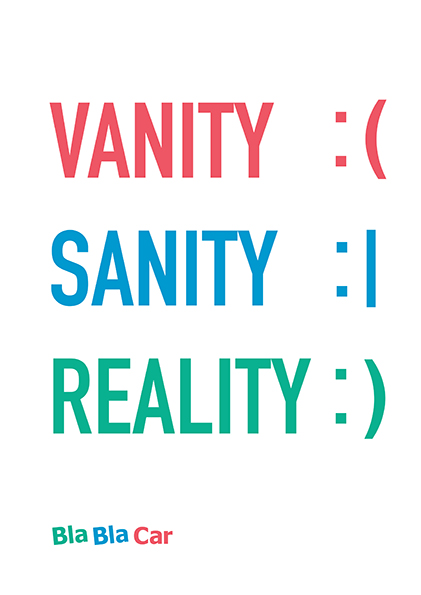Being humble is important to BlaBlaCar’s culture. It’s important to not get blinded by the wrong metrics or aim for vanity figures and results which simply flatter the ego. In fact, reality checks are critical for growth and it’s what keeps things moving in the right direction. That’s why one of BlaBlaCar’s core values is “Vanity :( Sanity :| Reality :)”. As a data-driven company, Key Performances Indicators (KPIs) are at the forefront of all activities at BlaBlaCar from marketing campaign rollouts to investment rounds.
In order to grow, the team is encouraged to look at the right metrics, and improve them. To do this, it’s important to understand the various types of indicators in any activity. “Vanity” data refers to data which sounds great but is not actually useful in determining performance. To put this into perspective, BlaBlaCar is proud to count over 35 million members in its community but this number would be meaningless if members weren’t using the service frequently. Other indicators are closer measures of efficiency, and are referred to internally as “sanity” data. Finally there are some real indicators of performance which BlaBlaCar follows on a daily basis, known as “reality” data. In this case, the number of rides actually conducted and the number of people effectively travelling with BlaBlaCar are a much stronger metric to follow.
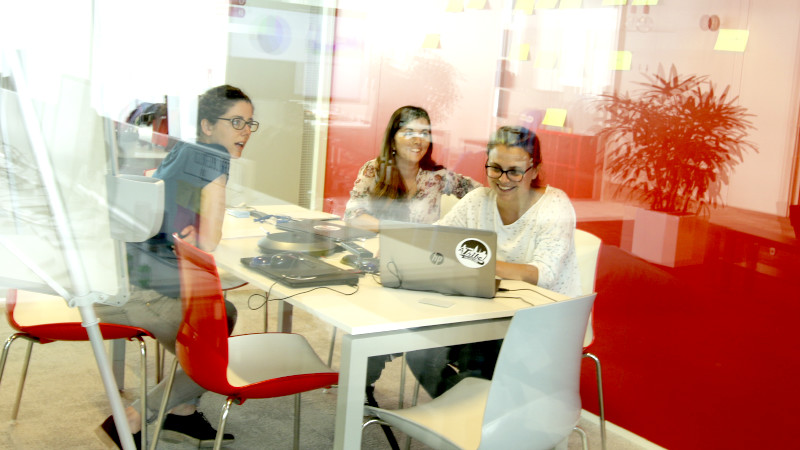
Being data-driven helps the team to be effective internally but it also helps when fundraising and talking to investors externally. With investors needing substantial data to make decisions, it encourages the team to dive into the metrics and build a strong case based on a thorough understanding of the activity.
Learning the hard way
When Nicolas Brusson arrived in California in 2000, everyone was talking about startups, stock options and venture capital. Despite it being a whole new world, he soon got caught up in the tech bubble and joined a telecommunications startup in Silicon Valley as employee number thirty-something. Although there was no business model in place, the company was raising tens of millions of dollars from top tier VC firms and kept on hiring people. In a matter of months they had grown to over 150 employees. And that’s when the tech bubble burst. With rounds and rounds of layoffs taking place, Nicolas sometimes felt he was in a bad dream as he witnessed people losing their jobs and being handed a cardboard box to pack up their belongings. A totally different culture to France, it stunned Nicolas that most people thought of it as fair game and simply moved on. Soon the number of employees dwindled down to just 10. Sitting in an empty building which they couldn’t afford, the company filed bankruptcy protection under Chapter 11 before management restructured it and a new acqui-hire eventually lead them back to success. Fortunate enough to be a survivor, 23 year-old Nicolas had witnessed a business go through an entire life cycle all the way from startup to growth to decline and then rebirth. During this intense period, Nicolas picked up some powerful learnings which has shaped him over the years and today is reflective of how he drives the growth and international expansion strategy at BlaBlaCar.
Exploring the world of financing startups
In 2009, BlaBlaCar was bringing in approximately €10k per month from sales of their platforms to businesses. The founders anticipated that they’d be able to operate until mid-2009. With that in mind, it was time to fundraise. After pitching BlaBlaCar to several business angels and venture capital firms, one group could see the potential and were willing to invest. They proposed a first investment of €300k which was contingent on the team finding an extra €300k within six months. Fred and Francis gathered €150k from friends of BlaBlaCar (fondly known as ‘The Believers’) and Nicolas, who had just taken up a position within a venture capital firm in London, set out to find the remaining amount.
Tapping into the connections that he was making across Europe, Nicolas approached several angels and investors and pitched the idea of BlaBlaCar. Raising money in 2009 – post-Lehman Brothers and with an ensuing global financial crisis – for a company that made little revenue proved difficult. The response was often negative with a key argument being that BlaBlaCar could never be a real large-scale monetizable business. Investment firms thought the platform was too niche and geared towards hitchhikers who would never part with their money. Their advice was to focus on selling carpooling platforms to businesses. But even at that, investors weren’t keen to invest. To them, the model didn’t seem scalable nor exciting enough.
Upon contacting Spanish angel, Luis Martin Cabiedes, Nicolas felt that there was interest. A few days later, Fred flew to Madrid to pitch the business in detail and soon after Luis visited the Paris office to meet the rest of the team. After carrying out speedy due diligence, he committed the remaining €150k which was needed to close the first seed round in mid-2009. This total €600k cash injection was exactly what was needed to accelerate growth, allowing BlaBlaCar to become France’s leader in terms of community size by 2010.
Investing the time to choose investors
Too many entrepreneurs think that raising money is a distraction and something they can outsource. Quite the opposite. Over the course of BlaBlaCar’s history, the founders have never used a bank or financial advisor to help raise funds. Instead, Nicolas has invested a lot of time in finding the right investors. It’s one of the very few things a founding team should stay very close to alongside its values, strategy and people. Choosing an investor can be likened to choosing a life long partner. In sharing the same ambition and values, there’s more chance for a solid, long-term relationship.
Deploying a robust business model, one which actually allowed revenues to cover costs, became the next goal in 2010. A subsequent round of financing began and the feedback received was much more positive than the last round. Investors could see that BlaBlaCar had achieved their initial objective and were starting to build trust in their execution capability. ISAI, a French fund bringing together internet entrepreneurs, moved in with an attractive proposition. Their mission was to invest in companies which showed strong signs of growth and were efficient without being too capital intensive. BlaBlaCar encompassed all three. The round was closed between ISAI and Cabiedes Partners for €1.25 million in June 2010 and brought Jean-David Chamboredon (ex-head of 3i venture in France), Pierre Kosciusko-Morizet (CEO of PriceMinister) and Didier Kuhn (ex- CEO of ScreenTonic) to the board.
Although BlaBlaCar was still a free classified site and only operating in France at the time, the founders and ISAI both had the shared vision of it becoming a transactional site with the ambition to expand internationally. Today BlaBlaCar continues to work with investors with whom they have the best fit and with those who bring the highest added value. Over the years a handful of investors have become invaluable mentors to the founders and have coached them throughout the years on management, recruitment and growth.
Raising money when you have money
BlaBlaCar has always approached investors prior to finding themselves in a potentially challenging financial situation. With discussions tending to be more balanced when not under pressure for immediate cash, it also allows for discussions with several different investors. When the decision was taken to scale faster and accelerate expansion into neighbouring countries, Nicolas began reaching out to several VCs in early 2011 including his old friend Philippe Botteri, whom he knew well from his time in Silicon Valley. As luck would have it, Philippe was just in the process of moving from San Francisco to work at Accel Partners in London. Being in the same building as Amadeus Capital, where Nicolas worked at the time, they ran into each other in the elevator. Philippe, who had already known about BlaBlaCar for a long time, bought into the European vision of BlaBlaCar. He made the bet and invested $10million. The investment world was shocked and wondered why Accel Partners were investing in a “hitchhiking company” which wasn’t even monetized. That’s when Nicolas joined BlaBlaCar full-time.
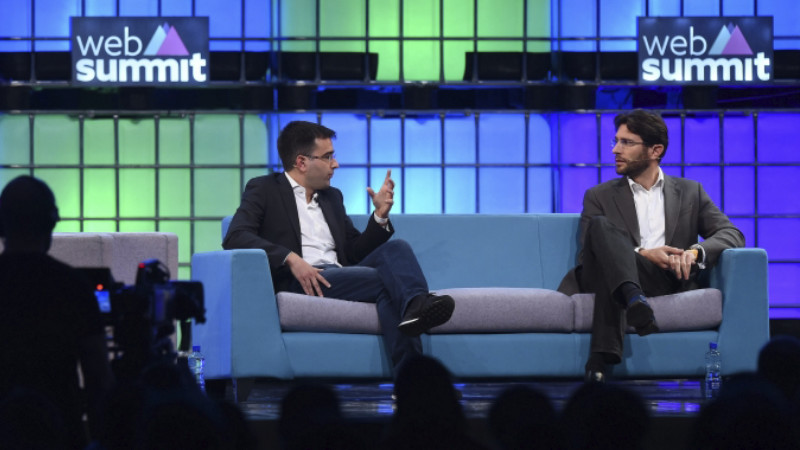
Creating enduring value
Unafraid of share dilution, Nicolas has always been an avid believer in raising money to create enduring value and to give the company a real shot at global leadership. At the same time, his Silicon Valley days have shown him the critical importance of staying capital efficient and to not spend money too fast.
With BlaBlaCar operating in France, Spain, Germany, Portugal, Italy and Poland, the objective of the next fundraise was to accelerate expansion in order to become the global leader in long-distance carpooling. In July 2014, the team raised a round of $100 million in funding led by Index Ventures, along with prior investors Accel Partners and ISAI, with Lead Edge Capital participating. At that moment, it was the largest-ever round of venture capital raised by a French startup. The founders even received a phone call from the French President congratulating them. It was a humbling moment to see just how far they’d come over the years.
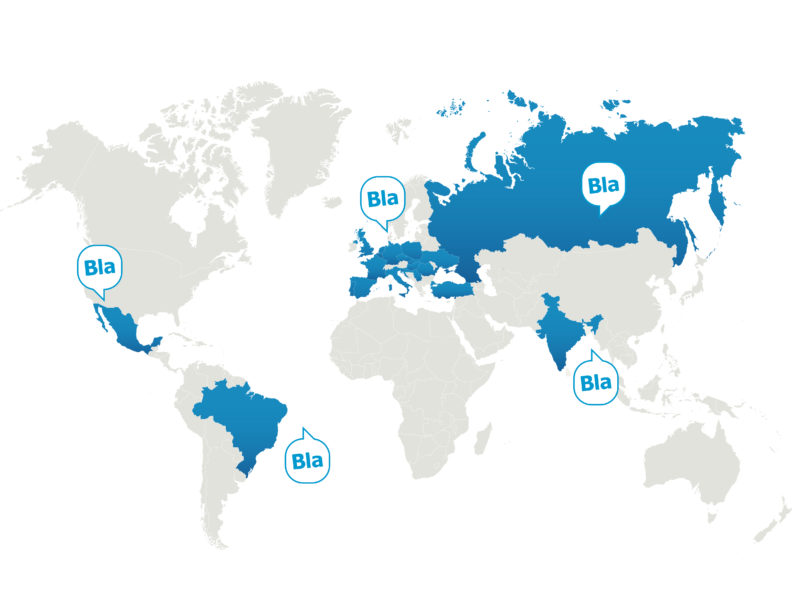
Soon BlaBlaCar had 20 million members in its community and had expanded into Russia and Ukraine. In 2015, they raised a further $200m with Insight Venture Partners, Lead Edge Capital and Vostok New Ventures. This massive cash injection allowed BlaBlaCar to expand much further internationally. It thoroughly fueled their global growth and reinforced their capacity to innovate and improve their service in order to consolidate existing markets, whilst also putting BlaBlaCar on the map as a Unicorn.
Joining the list of billion-dollar startups and becoming one of the first Unicorns in France was a significant milestone for the team. But instead of the founders getting blinded by this status, they sent out a company-wide email to thank everyone for their hard work and relentless passion. In it, they also reminded people that an exciting journey lies ahead in building a global travel network and bringing value to all.
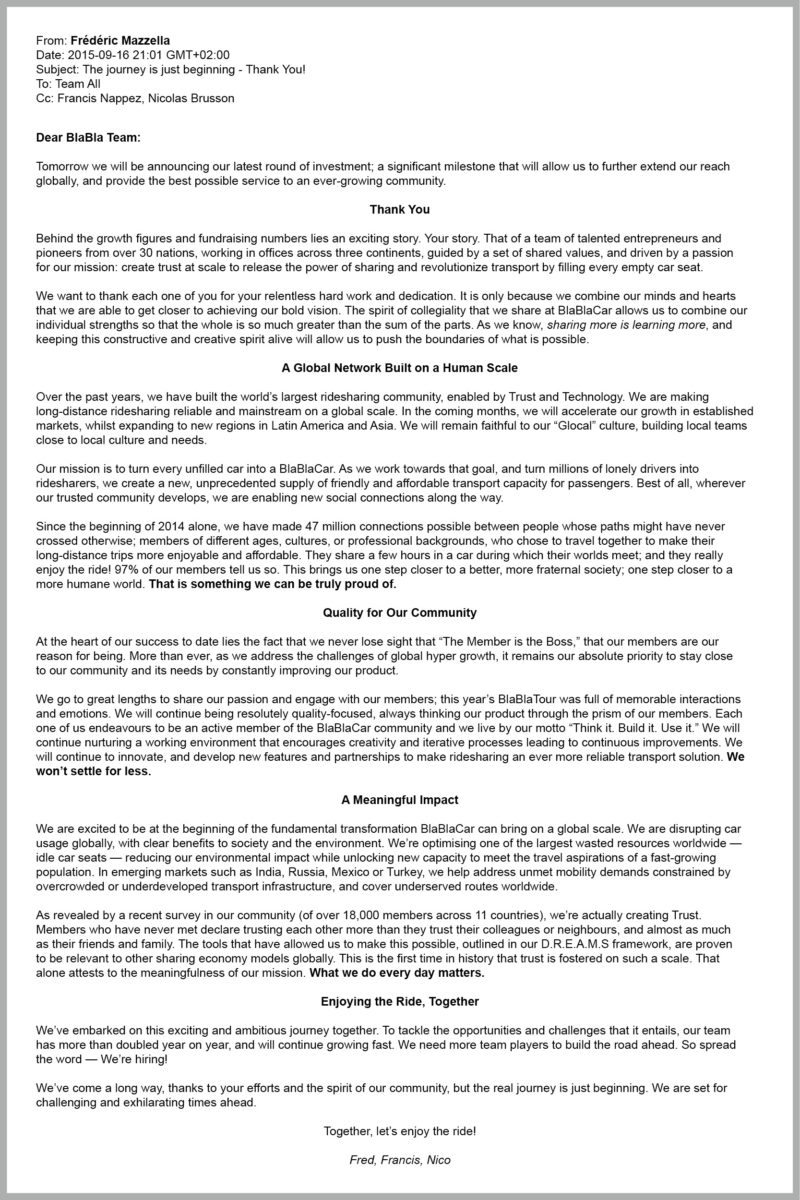
Even though BlaBlaCar now operates in 22 countries across 3 continents and connects millions of drivers with empty seats to passengers travelling in the same direction, the team continues to study what information drives the facts when faced with key decisions. Understanding the right metrics and staying true to the “Vanity :( Sanity :| Reality :)” value is what keeps things in check at BlaBlaCar.
